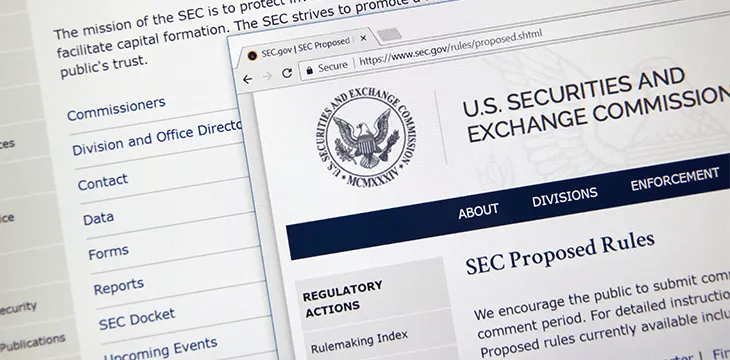|
Getting your Trinity Audio player ready...
|
The U.S. Securities and Exchange Commission (SEC) has settled with blockchain-based alternative trading system (ATS) firm tZERO which it accused of violating federal disclosure rules. According to the SEC’s order, tZERO failed to adhere to several federal regulations, including disclosing key information to regulators. This included sharing order information with Blue Ocean Technologies, a Singaporean broker-dealer that tZERO would later acquire.
tZERO, a subsidiary of American internet furniture retailer Overstock, also failed to file disclosures related to changes in its operation.
“The display of order information from its after-hours NMS stock order book was a material change to the operation of the ATS, for which Respondent was required to file an amendment on Form ATS at least 20 calendar days prior to implementation,” the SEC claimed, alleging that tZERO only started filing this information two years after it began sharing order information with Blue Ocean Technologies.
The SEC also alleged that tZERO did not make all required disclosures to the Commission “concerning its subscriber’s display of order book information for certain Digitally Enhanced Securities.”
tZERO was ordered to cease and desist from committing any violations under the Exchange Act. The SEC also imposed an $800,000 civil penalty on the ATS firm while neither denying nor admitting the SEC’s charges.
tZERO was founded by Patrick Byrne, who’s also the founder and was at the time CEO of Overstock. tZERO, being an alternative trading system, offers trading and settlement for the U.S. national marketing system (NMS) stocks but is regulated differently from a regular stock exchange. It had also established itself as a key player in trading security tokens built on blockchain networks and also ventured into digital currency trading.
Despite getting wide publicity and touting itself as the go-to marketplace for security tokens, tZERO failed to take off as initially projected. A year into its operations, it had only managed to list two tokens, with one being its own token and the other being tied to its parent company Overstock. This poor performance forced it to lay off some of its staffers, with the key executives taking up to 50% in pay cut.
Watch: CoinGeek New York panel, Investing in Blockchain Ventures
https://www.youtube.com/watch?v=SdWurEo58ok

 09-05-2025
09-05-2025 





